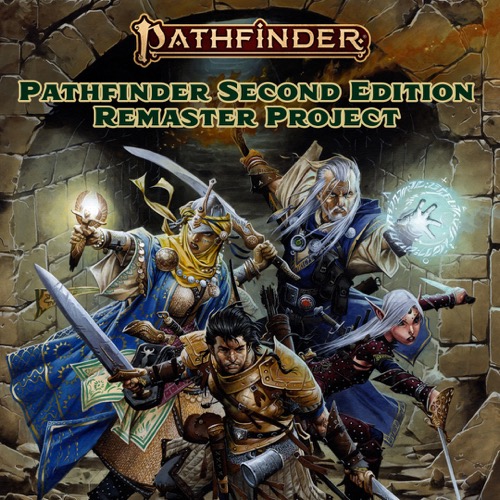It's October, and you know what that means—the leaves are falling, pumpkin spice floats on the wind, and the scourge known as candy corn is appearing on store shelves, and so I, James, am here to put on my pointy hat and talk about all things witchy coming in the Remaster!
As we've mentioned in some of our past material, the witch was a class we were excited to put into the first book of the remaster, the Player Core. The witch is a really iconic fantasy theme with a ton of historical and cultural grounding, and a popular player archetype for many characters. Unfortunately, we were also aware that the witch class has not quite always done the best at living up to this fantasy. The Remaster sees the witch as one of the most heavily changed classes, in ways that aim both to increase the class’s overall power budget as well as to express the witch’s unique flavor in an evocative way.
In Pathfinder, the witch’s defining feature is their relationship with their familiar and their patron—the witch does not get power from study, or from inherent gifts, but as part of a bargain made with a mysterious patron entity, with a magical familiar there to both provide power and make sure the witch is advancing the patron’s agenda. To highlight the fact that the witch is the premier familiar user in the game, we’ve increased the capabilities of their familiar from its original version. Now, the witch’s familiar gains even more abilities, one of which is wholly unique to the patron. These unique familiar abilities both help to express the patron’s theme, and they generate a passive effect every time the witch Casts or Sustains one of their hex cantrips. For example, a familiar granted by the Silence in Snow patron is forever cold to the touch—it might be the color of ice or its breath might crystallize in the air—and so every time you cast your sustain one of your hex spells, frost will form next to your familiar, creating difficult terrain. Many of these abilities are strong, but have very short ranges from your familiar, so be sure to keep your little shadow cat or curséd raven safe with spells like phase familiar or patron’s puppet, which can help to shield them from damage or let them dart quickly in and out of safety.
We’ve taken advantage of the Remaster to also do some general quality of life changes to the witch and make their abilities a little easier to use. Many hex cantrips now no longer make enemies temporarily immune to their effects once cast, as we felt that having to sustain them and having the limit of 1 hex cantrip per turn (it turns out, your patron doesn't like being pestered for supernatural favors three times in a six-second window) was already enough of a limit for most abilities. We also expanded some hex cantrips that were overly narrow, like wilding word, which used to function only against animals, fungi, or plants, but now function against any creature, with animals, fungi, and plants being especially vulnerable to its effects. Between loosening these restrictions and the unique abilities from familiars that happen when you Cast or Sustain a hex cantrip, the witch should be seeing a fair bit of hexing during their turns.
But of course, as your witch grows in power, so too can your familiar, which can gain various special abilities through higher-level feats. Some of these feats let your patron themself manifest through your familiar, to spooky effect. For instance, the new Patron’s Presence feat directs your patron's baleful attention to the battlefield, partially disrupting the magic of other spellcasters.
Patron’s Presence — Feat 14
WitchYour patron can direct its attention through your familiar, and its mere presence becomes an ominous weight on the minds of other beings to distract them and blot out their magic. Your familiar gains the following activity.
Patron’s Presence [two-actions] (aura) Frequency once per hour; Effect A palpable weight extends from your familiar in a 15-foot emanation. Enemies who enter or start their turn within the aura must succeed at a Will save against your spell DC or become stupefied 2 as long as they remain within the aura, or stupefied 3 on a critical failure. The aura lasts until the end of your next turn, but the familiar can Sustain it up to 1 minute.
Beyond some of these feats that lean on the Pathfinder side of witch mythology, we also wanted to go back to the rich folklore of witches worldwide and draw on this when we were giving witches new feats—and they’re getting quite a fair number of them! It would be remiss of me not to call out my very witchy colleagues Simone D. Sallé and Shay Snow, who drew on their deep knowledge of folk magic to suggest the seeds that grew into abilities like Ceremonial Knife, which allows a knife or dagger to direct magical energies like a magic wand; the new iron teeth Witch’s Armaments (supplementing eldritch nails and living hair); or Witch’s Broom, which lets you anoint a broom with flying ointments to transform it into a flying broomstick that you can ride through the night sky (this also works with a staff, polearm, or other broom-like object—not saying there are vacuum cleaners in Golarion, but I am saying the book gives you what you need to live your best Mary Sanderson life).
And with that, I think it's time for me to get into my Witch’s Hut and use its new Leap option to spin thrice and cast a 10th-rank teleport away! Be careful not to get cursed out there, and keep your eyes of newt on this space for more Remaster news!
The shadow remains cast,
James Case (he / him)
Senior Designer
Witch, Witch, You’re a Remastered Witch
Friday, October 13, 2023








